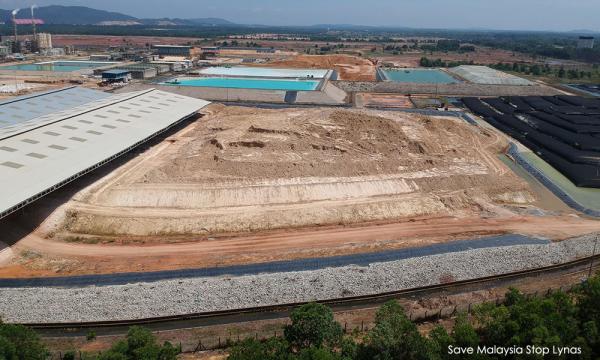The Ministry of Energy, Science, Technology, Environment and Climate Change has decided not to allow unlimited accumulation of waste residue at the Lynas Advanced Materials Plant (Lamp) amid fears over the increased risks it poses to the wellbeing of the community.
The ministry in a statement today said the decision was based on a report by the Executive Review Committee on the Operations of the Lynas Advanced Materials Plant, and that Lamp would need to meet certain pre-requisites for future licenses or renewal approvals.
The ministry stressed that the accumulated Water Leached Purification Residue (WLP) in Lamp which contains radioactive materials must be removed from Malaysia.
It also noted that Lynas Corporation Ltd, Australia (Lynas Australia) and Lynas Malaysia Sdn Bhd (Lynas Malaysia) had each presented letters of undertaking dated Feb 23, 2012, and March 6, 2012, respectively, indicating their commitment to removing Lamp residue from Malaysia, if necessary.
Lamp’s Temporary Storage Licence expires on Sept 2, 2019.
The ministry said that meanwhile, for the non-radioactive Neutralisation Underflow Residue (NUF), Lamp must submit an action plan on the disposal of its accumulated wastes before it will be considered for future applications under Rule 9 (6) and 9 (7) of the Environmental Quality Regulations (Scheduled Waste) 2005.
According to the report, the current approval for the storage of scheduled wastes is valid until Feb 15, 2019.
The ministry said it views seriously the current accumulation of the two primary residues at the Lamp, namely 451,564 tonnes of WLP dan 1.113 million tonnes of NUF.
It also noted that the on-site residue has been accumulated for six years since the beginning of operations in 2012.
This, according to the ministry, raised concerns, as the site was exposed to the threat of natural disasters such as major flooding and the risks to the surrounding communities and environment would increase as the amount of accumulated residue grew.
The ministry also noted that Lynas Malaysia Sdn. Bhd. (Lynas Malaysia) was conducting research into the potential recycling of WLP and NUF residues as a soil conditioner named Condisoil.
“However, having received expert opinions, the Review Committee reports that the duration of the studies was insufficient to conclude on the safety of using Condisoil,” it said, adding that it agreed with the committee’s recommendation that long-term studies could be conducted without the use of WLP residue.
WLP is a solid waste containing naturally-occurring radioactive material (Norm) with a radioactivity of 6.2 Bq and is regulated by the Atomic Energy Licensing Board (AELB) in accordance to the Atomic Energy Licensing Act 1984 (Act 304) as well as other associated regulations.
NUF is categorised as a scheduled waste and is regulated by the Department of Environment (DOE) in accordance to the Environmental 2 Quality Act 1974 under Rule 9 of the Environmental Quality Regulations (Scheduled Waste) 2005.
- Bernama


